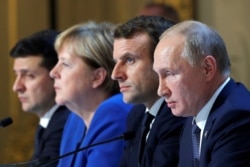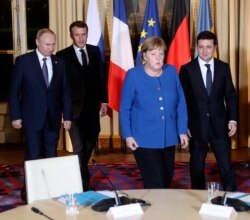The leaders of Russia and Ukraine met for the first time in three years in an attempt to end the conflict in eastern Ukriane. In the wake of that meeting earlier this week in Paris, attention now shifts to renewed peace efforts to stem the violence between Ukrainian government forces and Moscow-backed separatists.
Yet in interviews and comments online, analysts warn that while important gestures were made, Russia and Ukraine remain far apart on key aspects of the five-year conflict, which has killed at least 13,000 people, and shows no signs of abating.
One well-accepted view holds that the mere fact that Monday's Paris talks took place was reason enough for French President Emanuel Macron to smile.
"The fact that we sat side by side today ... is an achievement," Macron told reporters.
The French leader, with backing from German Chancellor Angela Merkel, has been the driving force behind renewed European efforts to persuade Ukraine and Russia to return to the negotiating table.
"Macron showed that Paris is ready to play a bigger role in European politics," Alexey Pushkov, a Kremlin ally and former member of Russia’s Federation Council, wrote in a tweet that praised the meeting.
Left unmentioned? Macron is also seen by Kremlin allies as a rare and recent European voice pushing for renewed detente with Moscow.
Zelenskiy vs. Putin
The highest stakes going into the talks, however, belonged to Ukrainian President Volodymyr Zelenskiy.
Analysts wondered how Zelenskiy, a 41-year-old comedy actor elected to the presidency in a stunning landslide victory earlier this year, would fare against a far more seasoned opponent in Russian President Vladimir Putin.
Indeed, in advance of the summit, crowds gathered in Kyiv warning Zelenskiy against appeasing the Kremlin. Protesters held signs saying, "No Capitulation" and "No Red Lines."
The Ukrainian leader seemed to receive the message.
"I felt the whole of the Ukrainian nation with me," Zelenskiy said during a press conference following the talks. "I’m here representing all Ukrainians."
Analysts said Zelenskiy held his own, with neither Russia nor Ukraine gaining the edge in negotiations, which bore signs of a thaw in relations, yet no overt breakthroughs.
"Everyone believed that Putin would be able to prevail over Zelenskiy, that Zelenskiy is no competitor to him," Konstantin Skorkin, a Ukraine specialist at the Carnegie Moscow Center, told VOA.
"But the reality showed that they could talk to each other and their previous telephone communications led to some progress in the peace effort," Skorkin said.
"I think it would be appropriate to be diplomatic as we’ve just started talking. Let’s say for now it’s a draw," Zelenskiy said to journalists.
Putin, more sanguine, allowed that a spate of recent diplomatic initiatives signaled a "warming" in relations.
"All this gives us the grounds to suppose that the process is developing in the right direction," the Russian president said.
For all the diplomatic pleasantries, neither leader appeared to acknowledge the other in public.
Results not talk
For now, the Paris talks yielded the promise of a cease-fire, despite what Russia and Ukraine acknowledge were several previous failed attempts to stop the fighting.
The warring parties will take "immediate measures to stabilize the situation in the conflict area," according to a signed communique.
Equally pressing? An agreement for a mass prisoner swap with the rebels before year’s end.
Beyond a gesture of goodwill to unite families ahead of New Year's, the measure builds on a widely heralded prisoner exchange negotiated between Putin and Zelenskiy in September.
Putin also hinted at a deal to transit discounted Russian gas to, and through, Ukraine to Europe.
There was wide agreement, however, that the Paris talks brought little progress to the core issue of the war: the future of the Donbas region in east Ukraine, and the status of two unrecognized "independent republics" in Donetsk and Luhansk.
Prisoner exchanges and other compromises are "peripheral to the conflict, and don't go to the heart of the matter - the heart being the status of the Donbas," wrote Tatiana Stanovaya of Reality of Russian Politics in a Facebook post assessing the Paris negotiations.
"Both sides are confident that they are right and they are not going to retreat. It doesn’t matter who’s right or wrong," Shorkin, of the Carnegie Moscow Center, told VOA.
"Each side is sticking to their position. No one is willing to back down," he said.
Zelenskiy said Kyiv still wants to reestablish full control over Luhansk and Donetsk, the two self-proclaimed independent republics.
Putin also is insisting Ukraine adhere to promises under the so-called Minsk Agreements negotiated under Zelenskiy’s predecessor, Petro Poroshenko.
The Minsk accords, negotiated in 2015 and 2016 with European backing, allow for increased autonomy in the separatists regions, as well as direct talks with the rebels as a precursor to Russia handing over control of the Ukraine-Russian border to Kyiv.
East vs. West
Many in Kyiv argue the Minsk accords give Moscow undue influence over their ambitions to join the European Union and, perhaps, one day NATO.
In Russia, the battle over Ukraine is widely seen as part of the Kremlin’s insistence that Ukraine serve as a buffer state against the alliance’s expansion east toward Russia’s border.
Analysts argue the Minsk agreements also portray Russia as a mediator in the conflict, masking its role as the separatists’ key backer, providing money, soldiers and weapons, facts well documented by independent journalists on the ground.
"Everyone perfectly realizes who these leaders in Luhansk and Donetsk are," Moscow-based political analyst Yuliy Nesnevich told VOA.
"What is the point to come to an agreement with them when it’s clear who really stands behind them? When it’s clear who is the puppet master?" Nesnevich said.
Going forward, the diplomatic calendar is clear.
The so-called Normandy Format quartet of nations reconvenes in four months in Berlin.
Its mission is to assess the Paris agreements and revisit what are seemingly incompatible positions between Moscow and Kyiv.
Whatever progress the parties make may determine the Donbas’ last chance at seeing something resembling peace, analysts said.
Withdrawal from negotiations has "no broad support," Carnegie’s Skorkin said. But the alternative is far messier, he said.






